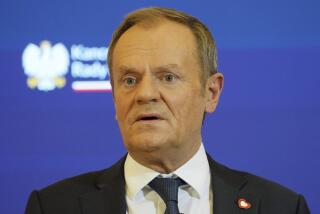EASTERN EUROPE : In Poland’s Economic Path--Potholes : Opponents get a chance to tee off on reform program ahead of fall elections.
- Share via
WARSAW — The Polish economic reform program, hailed by Western lenders, governments and financial institutions, is beginning to run into heavy political weather.
With parliamentary elections scheduled for October, political operatives who see bankruptcies and factory closings looming in the coming months have taken aim at the economic reform plan guided by Leszek Balcerowicz, the finance minister.
Today and Saturday, a key economic debate has been scheduled in the Belvedere Palace, headquarters of President Lech Walesa. It is an event widely perceived as a chance for Balcerowicz’s opponents to tee off on his program.
The conflict between the two main opposing schools of thought has to do with the speed with which Balcerowicz’s team has pressed its economic plan. In general, all sides are in agreement on the long-range goal of privatizing the state-dominated economy and moving to a Western-style market system.
The main pillars of the Balcerowicz plan have been to stabilize inflation and hold firmly to an exchange rate set after a massive devaluation of the Polish currency, the zloty, in January, 1990.
To the amazement of many observers, the government has stayed the course and largely succeeded in its goals, cutting inflation from the January, 1990, level of 79% per month to 3%, the estimate for this month.
The battle against inflation has been waged at the cost of widespread worker dissatisfaction, as wages have been held down and consumer prices have risen, albeit at a lower rate than before.
And now some economists are worried about the threat of recession, as less efficient state-owned factories teeter on the edge of bankruptcy and Polish export firms find that their goods are less of a bargain to buyers than they were two years ago.
A center-right political grouping known as the Center Alliance has taken up the cudgel against the Balcerowicz plan, with its chief economic experts arguing that the greatest danger in the present policy is stagnation.
Jerzy Eysmont, government director of central planning and chief economist of the Center Alliance group, says he is alarmed by a drop in industrial output, a reduction of Polish exports (a $225-million trade deficit last month as the most recent evidence), the threatened closure of 100 machinery manufacturers and the specter of 2 million unemployed.
“I am worried that we may be headed for a prolonged, strong recession and a permanent drop in production,” Eysmont says.
Eysmont and others in the Center Alliance want to see the zloty devalued to help boost exports. They also advocate selectively easing credit to assist some firms in the midst of restructuring. Some also want to see the pressure eased on wages to help reduce the threat of strikes and worker dissatisfaction.
Poland’s international creditors are fully on Balcerowicz’s side in the debate--although officially, institutions such as the International Monetary Fund and World Bank do their best to stay clear of such political arguments.
But it was Balcerowicz’s plan that won for Poland a 50% reduction in its official debt of $44 billion and an agreement last month on a new loan of $1.5 billion from the IMF.
Although the Belvedere debate was widely trumpeted as a showdown for Balcerowicz when it was first proposed, the drama has since eased considerably. Walesa postponed the meeting once and suggested it might be canceled entirely; his aides have more recently tried to downplay its significance.
Most important, perhaps, the impression of Balcerowicz being called to answer before a court of dissident economists has been largely dissipated; nor is Walesa likely to issue a concluding statement declaring one side or other the winner. Moreover, observers say, the pressure on him is great to avoid changing horses in midstream.
“Mostly, I think the meeting is a safety valve,” Eysmont says. “But we have to be aware there are serious political pressures on the program, and if we do not take them into account, we could be in for political trouble.”
But at the least, the debate is likely to set the agenda for the forthcoming parliamentary election campaign, in which the bread-and-butter issues of suppressed wages and growing unemployment will be aired--with Balcerowicz and his economic plan providing the most tempting targets for the campaigning politicians.
More to Read
Sign up for Essential California
The most important California stories and recommendations in your inbox every morning.
You may occasionally receive promotional content from the Los Angeles Times.













